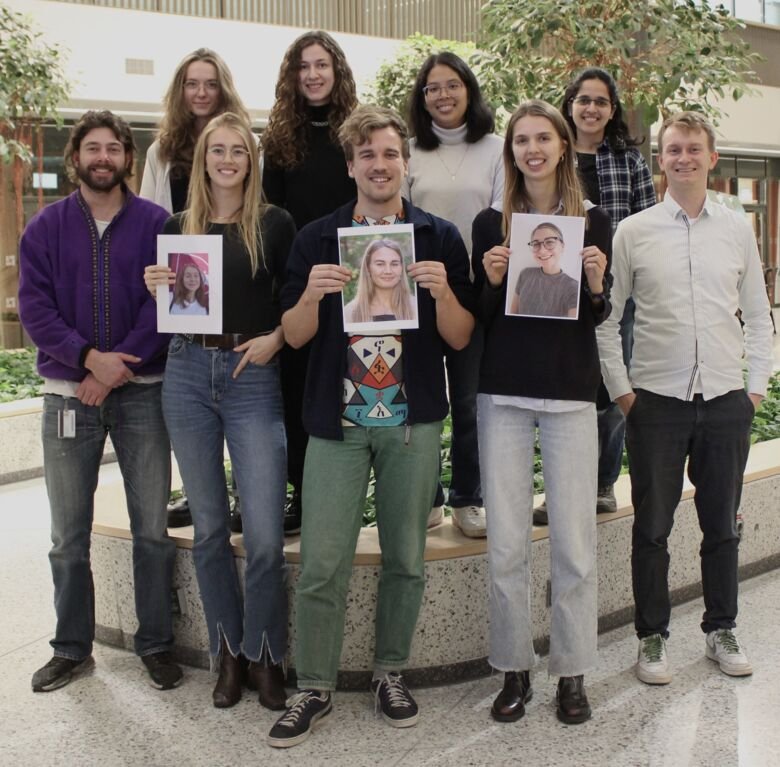Students initiated KI's first Planetary Health Report Card as part of efforts to establish a sustainable medical school

The authors of KI's first Planetary Health Report Card (PHRC) are twelve students from KI's various educational programmes. The commitment comes from a common interest and concern for the environment, climate, and planetary health.
“As future health professionals, we think it is important to work towards a sustainability agenda at our university. We in this group share a commitment and a strong concern for the state of the environment and the ongoing climate crisis affecting our health," says Nikolaus Mezger, a KI student and one of the authors of the PHRC report.
In addition to the implementation of the PHRC report, some of the students were involved in setting up the Students for Sustainable Development (SSD) group at KI and running the 'Our Health is Burning' (Vår hälsa brinner) campaign in 2021, on the health impacts of climate change. Both groups want to promote change for sustainability in society, with one of the ways being the implementation of the Planetary Health Report Card (PHRC).
Ratings and recommendations
The implementation of the report is led by student groups and aims to enable KI to identify improvements and initiatives in selected areas.
The report contains 51 points in the five areas:
- Curricula in the medical programme.
- Interdisciplinary research.
- Public relations and advocacy.
- Support for student-led initiatives.
- Sustainability on campus.
The student group reviewed sources such as KI's website, newsletters and curricula for the medical programme. They also contacted faculty members, functions within the different areas and staff responsible for sustainability issues to get their feedback.
Each selected area was then given a grade from A to E, with A being the highest and E the lowest. Each grade was accompanied by a justification and the students' recommendations for improvement in each area. KI received a total grade of C, which is at the centre of the assessment scale. The different areas then received between B+ and D.
KI's Council for Environment and Sustainable Development
“It is both gratifying and important that KI's students are engaged and active in various issues, not least the important issue of the health of our planet. Within the Council for Environment and Sustainable Development, we continuously try to identify areas where KI can make a difference. The report is clearly relevant to this work. In 2024, we will, among other things, produce data on business travel at KI, communication about this and continue to assist in integrating sustainable development into the educational programmes”, says Karin Dahlman-Wright, chair of the Council for Environment and Sustainable Development at KI.
The integration of environmental and sustainability issues in the curriculum of the medical programme was one of the areas examined in the report and the results showed that integration is lacking in the early semesters. This has now been introduced when the medical programme becomes a six-year programme. Karin Leander is a senior lecturer at the Institute of Environmental Medicine and is one of several who have worked on integration.
“The established curricula for the six-year medical programme include learning outcomes that allow for the integration of environmental and sustainability issues in teaching. For example, there are objectives to explain how environmental factors affect our health. There is a great awareness among the programme management that this content is important and they are working to spread awareness and increase the knowledge of the teaching staff in this important area”, says Karin Leander, who works with the introduction of environmental and sustainability issues in the medical programme.
Another area highlighted in the report was sustainability at KI's campus and that KI's climate strategy aims to reduce its carbon footprint by 50 per cent by 2030 and follow guidelines in line with the Paris Agreement. However, the student group believes that more stringent measures are needed to achieve the goals. In its recommendations, the group suggests that more mandatory and significant measures should be integrated into KI's daily operations.
“We believe that KI has taken several good initiatives on sustainability, ranging from organizing sustainability awards to major conferences and events on planetary health. An analysis of KI's carbon footprint has been conducted and the KI Council for Environment and Sustainable Development has made a number of proposals to make the campus more sustainable. However, the implementation of many initiatives is still ongoing, and many proposals are voluntary. The PHRC highlights opportunities to take systematic action and we strongly believe that with commitment from staff, students and management, KI has the chance to become a world leader in planetary health and sustainability," says Nikolaus Mezger.
Sharing the results
The Programme Director for the medical programme has contributed to the report and the students have presented the results to KI's Council for Environment and Sustainable Development, the Committee for Research and the Programme Committee for the medical programme. They were also invited to present it at a workshop on sustainable development at KI's Teachers' Day 2023.
"We are extremely grateful for all the interest shown by various KI bodies and look forward to continuing our constructive collaboration as we write the PHRC for 2024," says Nikolaus Mezger.
About the Planetary Health Report Card (PHRC)
- The PHRC is a measurement-based tool to evaluate and improve the content of planetary health (health from a global perspective).
- The initiative came from medical students at the University of California San Francisco (UCSF) in 2019.
- Reports are made by students with the support of mentors within their institution.
- The report identifies opportunities for improvement which are then shared with relevant parts of the organisation.
- The results are published in an annual Earth Day report, which helps track institutional changes over time.
- The use of the PHRC has grown rapidly and has now evaluated over 100 medical programmes in 15 countries.
